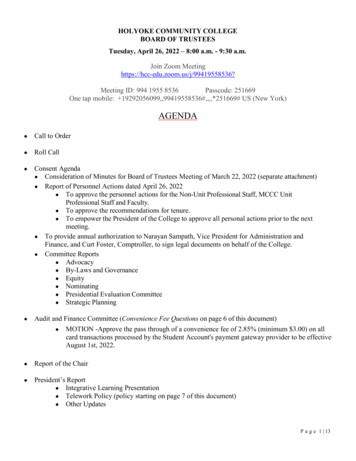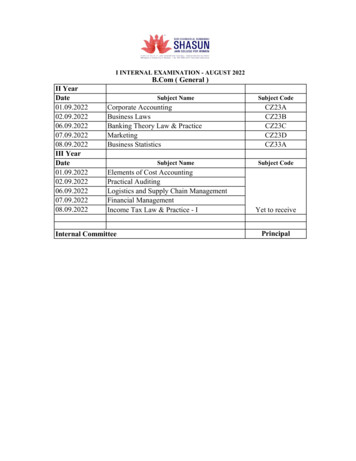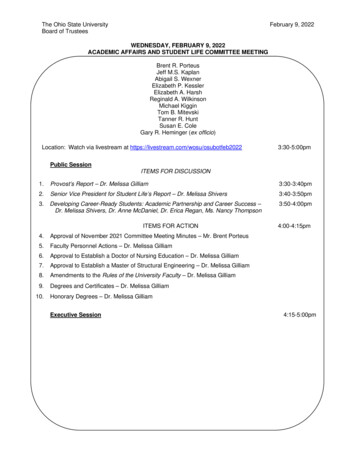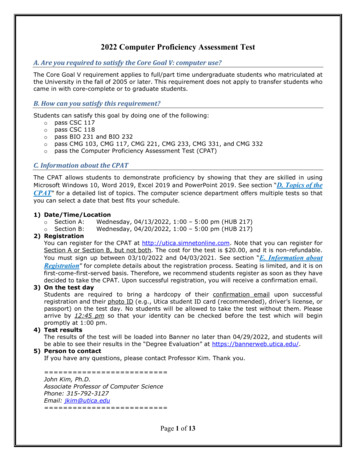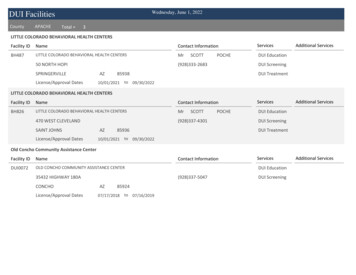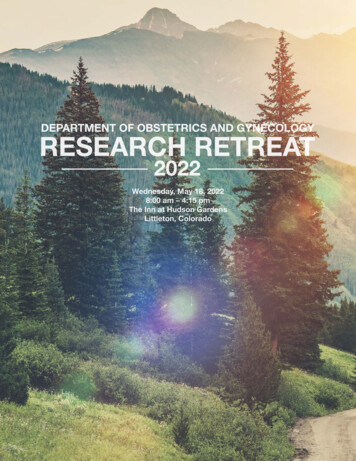
Transcription
Wednesday, May 18, 20228:00 am – 4:15 pmThe Inn at Hudson GardensLittleton, Colorado1
Research Retreat Planning CommitteeHeather Aldrich, PhDMaddie BookOlivia CastilloBradley Corr, MDMarsha K. Guess, MD, MSKaren Hampanda, PhD, MPHThomas Jansson, MD, PhDEmily Su, MD, MSCILevi Watson, PhD
A welcome from Thomas Jansson, the Program Chair,Emerging from COVID lockdown and restrictions and university administrative challenges, we now gatherin person at the South Platte River to enjoy SCIENCE for a full day without interruption! WELCOME!I would like to thank the members of the Research Retreat Organizing Committee for developing acompelling program that features distinguished keynote speakers and displays the diversity and highquality of the research in our department. A very special thanks to Maddie Book, Olivia Castillo andNicole Fuentes who have worked tirelessly to make this research retreat happen. I also would like toextend a warm welcome to the keynote speakers who graciously agreed to travel to the ‘frontier’ andpresent some of their most exciting science in person at Hudson Gardens! Finally, thanks to all themembers of our amazing department that were able to join us today! I hope you will enjoy the retreat,learn something new and engage in networking to find new friends and scientific collaborators!Thomas Jansson, MD, PhDFlorence Crozier Cobb Endowed ProfessorChief, Division of Reproductive SciencesVice Chair of Research, Department of Obstetrics and GynecologyUniversity of Colorado, School of MedicineA message from Dr. Nanette Santoro, Department Chair,Welcome to the Department of Obstetrics & Gynecology’s Research Retreat! Your very presence heredemonstrates your commitment to the tremendous effort and growth of research in our Department thatreflects our common goal of creating and sustaining a top-tier national research program that has strengthin all areas of our specialty. As Chair, my role has been to facilitate engagement in the collective vision,resource the needed recruitments, and contribute personally as much as I can. But each and every one ofyou present today has played a key role in the success of our research mission. In case you haven’t seenhow much fun we have doing research at the University of Colorado, check out our video evidence.I would be remiss if I did not acknowledge our tremendous leadership: Vice Chair for Research ThomasJansson, Associate Vice Chairs Raj Kumar and Jeanelle Sheeder, and our awesome administrators:Majik Abidzhanova, Olivia Castillo and staff: Maddie Book, Pamela Alvarez, Greta Devol, Jillian Ellerman,Zejian Liu and Naila Naushad.So, sit back, relax, and enjoy the fruits of your collective labor!Nanette F. Santoro, MDProfessor and E. Stewart Taylor ChairDepartment of Obstetrics and GynecologyUniversity of Colorado, School of Medicine3
WRHR Alumna Presentatio Virginia D. Winn, MD, PhDAssociate Professor Obstetrics and GynecologyDivision Reproductive, Stem Cell and Perinatal Biology, DirectorDivision Maternal Fetal Medicine and ObstetricsH&H Evergreen Faculty ScholarStanford University School of MedicineTraining & EducationUniversity of Rochester School of Medicine and DentistryUniversity of California, San Francisco School of MedicineNIH Reproductive Scientist Development Program (RSDP)Virginia D. Winn, MD, PhD, is an Associate Professor of Obstetrics and Gynecology (Reproductive and Stem Cell Biology) atStanford University, the Director of Reproductive, Stem Cell and Perinatal Biology at Stanford School of Medicine's Ob/Gyndepartment, and the Program Director for the Women’s Reproductive Health Research (K12) at Stanford Program. Dr. Winnreceived both her PhD training and medical education from the University of Rochester School of Medicine and Dentistry(in 1994 and 1996 respectively.) She completed her residency and fellowship at UCSF. She received research training throughthe NIH-funded Reproductive Scientist Development Program (RSDP). Dr. Winn was on faculty at University of Colorado andfrom 2006 to 2014 leading a basic and translational NIH-funded research program. She then moved to Stanford in 2014.She is Board Certified in Obstetrics and Gynecology and Maternal and Fetal Medicine from the American Board of Obstetricsand Gynecology.As a physician scientist, Dr. Winn’s ultimate goal is to see this knowledge translate to improved clinical care resulting inhealthier mothers and babies. Her lab uses a combination of molecular, cellular, tissue and translational studies in theirresearch. Additionally, Dr. Winn has mentored 40 undergraduates, medical students, graduate students, post docs,residents and MFM Fellows on research projects. Many of which who have received presentation awards and have goneon to faculty positions.Dr. Winn is a member of the Dunlevie Maternal-Fetal Medicine Center for Discovery, Innovation and Clinical Impact, theMaternal and Child Health Research Institute (MCHRI), the Stanford Cardiovascular Institute, BioX. She is a recipient theMCHRI Arline & Pete Harman Faculty Scholar award, and is currently a H&H Evergreen Scholar.Behind the talk,The Placenta and PreeclampsiaThe placenta is a remarkable organ that develops over 9 months of pregnancy. The placenta orchestrateschanges in maternal physiology to support the growth and development of the fetus. While placenta isa defining feature of mammals it is not highly conserved, and the human placenta is the most invasive.The normal development of the human placenta is essential for a healthy pregnancy and when there areabnormalities it can account for a number of pregnancy complications such as preeclampsia, accreta spectrumdisorder and fetal growth restriction. The Winn lab focuses on understanding the placental role in preeclampsiapathogenesis. Understanding the placental factors, the impact maternal immune system and account for theendothelial dysfunction central to preeclampsia will provide insight into unique biologic aspects and revealpotential therapeutic targets for preeclampsia.4
Keynote SpeakerPatti E. Gravitt, PhD, MSDeputy DirectorCenter for Global HealthUS National Cancer InstituteTraining & EducationJohns Hopkins University Bloomberg School of Public HealthUniversity of North Carolina at CharlottePatti Gravitt, PhD, is internationally recognized for her work in human papillomavirus (HPV) associated cancers. Her researchhas spanned the interdisciplinary spectrum, including the development and validation of HPV molecular diagnostics, evaluatingthe role of viral latency in the natural history of HPV infection, understanding cervical cancer risk across the lifespan, andimplementation of cervical cancer control interventions in a global context. In July 2021, Dr. Gravitt joined the NCI Center forGlobal Health as Deputy Director and leads implementation of the strategic scientific programmatic activities of the Center,currently focused specifically on global implementation science and cancer disparities.Behind the talk,Systems Thinking for Reducing Health Disparities“We can’t impose our will on a system. We can listen to what the system tells us and discover how its propertiesand our values can work together to bring forth something much better than could ever be produced by our willalone” – Donella H. Meadows, Thinking in Systems: A Primer.Health disparity is a prototypical ‘wicked problem’. Disparities are hard to define, offer no single solution, andare sufficiently complex that no one can claim a full understanding of the scope of the problem. They occurlargely because of deeply rooted mental models and system structures, both of which remain hidden beneaththe surface. Through both her work as a molecular epidemiologist and implementation scientist, Dr. Gravittbelieves that improving health disparities requires a fundamentally different scientific approach. Reducinghealth disparities will require a transdisciplinary research approach that embraces complexity, rather than tryingto control it. Systems thinking and complexity science, key methodologies used in organizational managementand ecology, builds on the foundational knowledge gained from decades of reductionist biomedical researchto view and model the dynamic and adaptive nature of biological and social systems, identify structural rootcauses of system dysfunction and associated high leverage change opportunities. Dr. Gravitt will illustrate howthese principles can guide the scientific process in both molecular epidemiology and implementation research.5
Keynote SpeakerAngeles Alvarez Secord, MD, MHScProfessor of Obstetrics and GynecologyDirector of Gynecologic Oncology Clinical TrialsAssociate Director, Clinical Research, Gynecologic Oncology ProgramDuke Cancer InstituteDuke University Medical CenterTraining & EducationUniversity of Washington Medical SchoolDuke UniversityAngeles Alvarez Secord, MD, MHSc, is a Professor in the Division of Gynecologic Oncology at Duke University. She completedher residency in Obstetrics and Gynecology and fellowship in Gynecologic Oncology at Duke. Dr. Secord has received awardsfrom Duke, Mid-Atlantic Gynecologic Oncology Society, Society of Gynecologic Oncologists, Gynecologic Oncology Group,and Foundation for Women’s Cancer for her research in angiogenesis. She is the Director of Gynecologic Oncology ClinicalTrials, the Associate Director of Clinical Research, Gynecology Oncology, and a NRG site Principal Investigator. She has servedas NRG Group Developmental Therapeutics Committee core member, Ovarian Cancer Committee core member, NRG NewInvestigator Committee Vice-Chair, GOG Foundation Education and Mentoring co-Chair, and AAOGF Scholar Chair. Her researchinterests include novel therapeutics and biomarkers in ovarian and endometrial cancer, novel clinical trial designs, and therole of obesity in gynecologic malignancies. Dr. Secord is a fellow of the American College of Obstetricians and Gynecologistsand active member of the Society of Gynecologic Oncology, American Society of Clinical Oncology, American Gynecological& Obstetrical Society, and International Gynecologic Cancer Society. She has authored more than 190 peer-reviewed articlesalong and has been the recipient of numerous clinical trial and basic/translational research grants.Behind the talk,Endometrial Cancer: Raising the Alarm and Promising New TherapiesEndometrial Cancer: Raising the Alarm and Promising New Therapies will explore the rising incidence andmortality rates of endometrial cancer. Globally there are over 400,000 uterine cancers and 97,370 deathsannually, and in contrast to most cancers, endometrial cancer mortality rates are increasing 2% per year. Ofutmost concern is the alarming disparity in survival with Black patients being at 2-fold increased risk of deathcompared to White patients. We will explore risk factors, the current treatment landscape, novel therapies, andthe underlying molecular biology of this disease. Tremendous progress in elucidating the molecular biology ofendometrial cancer has been driven by The Cancer Genome Atlas (TCGA) Research Project. The findings haveled to the recognition of four recognized endometrial cancer molecular subtypes, (1) DNA Polymerase-ε (POLE)mutated or ultramutated, (2) microsatellite instability (MSI) or hypermutated, (3) copy-number low, and (4)copy-number high. These four subgroups are characterized by distinct molecular alterations and are prognosticfor survival outcomes. With the TCGA findings there has been considerable adoption of next-generationsequencing (NGS) and tumor testing to direct therapy in patients with advanced/recurrent endometrial cancer.However, the impact of this approach to date is unclear. In order to assess the use of NGS testing, identifypotentially actionable genetic alterations, and assess the impact of matched targeted therapy in endometrialcancer we formed a national multidisciplinary consortium. We will share our preliminary results and outlinehow the consortium is facilitating the development of real world data on patterns of genomic testing and use ofmolecularly targeted therapies in patients with endometrial cancer.6
Keynote SpeakerMethodius G. Tuuli, MD, MPH, MBAChace-Joukowsky Professor and ChairChief of Obstetrics and Gynecology, Women & Infants HospitalExecutive Chief of Obstetrics and Gynecology, Care New England Health SystemDepartment of Obstetrics and GynecologyWarren Alpert Medical School of Brown UniversityTraining & EducationUniversity of Ghana Medical SchoolUniversity of California at BerkeleyEmory UniversityWashington UniversityKelley School of Business at Indiana UniversityDr. Tuuli is the Chace-Joukowsky Professor and Chair of the Department of Obstetrics and Gynecology at the Warren AlpertMedical School of Brown University, and Chief of Obstetrics and Gynecology at Women & Infants Hospital. A board certifiedMaternal-Fetal Medicine physician, his research is focused on the prediction and prevention of adverse obstetric outcomes.He employs large cohort studies, randomized clinical trials and meta-analysis to generate high quality evidence for managingobstetric problems including preventing of surgical site infection after cesarean delivery, management of labor, and optimizingmedical complications in pregnancy. His work is supported by the NIH and Gates Foundation and is published in high impactjournals including the NEJM, JAMA and JAMA Pediatrics. Originally from Ghana, Dr. Tuuli earned his Medical Degree from theUniversity of Ghana Medical School in 2001. He attended the University of California at Berkeley, earning a Master of Public Healthdegree in 2003 with concentration in maternal and child health. He completed residency training in Obstetrics & Gynecologyat Emory University in 2008, and fellowship training in Maternal-Fetal Medicine at Washington University in 2011. Dr. Tuulicompleted the Business of Medicine Physician MBA program at the Kelley School of Business at Indiana University in 2020.Behind the talk,Iron Deficiency Anemia in Pregnancy: Can We Do Better?Iron deficiency anemia is a common, under-treated problem in pregnancy. The prevalence of iron-deficiencyanemia in the U.S. is estimated at 16.2% overall in pregnancy and up to 30% at delivery, and it is associated withsignificant adverse maternal and neonatal outcomes. Moreover, iron-deficient mothers are at risk of deliveringiron-deficient neonates who, despite iron repletion, remain at risk for delayed growth and development. Whiletreatment with iron supplementation is recommended during pregnancy, important questions remain about theoptimal route. Oral iron therapy, the current standard, is often suboptimal with up to 70% of patients experiencingsignificant gastrointestinal side effects that prevent adherence to treatment, resulting in persistent anemia. Inaddition, the timing and frequency of oral iron can influence absorption. Intravenous iron is an attractive alternativebecause it mitigates the adherence and absorption challenges of oral iron. However, it costs more, and there arehistorical concerns about adverse reactions. Available data show that the predominant oral based approach leadsto 30% of patients with persistent IDA at delivery and an associated 3 to 6-fold increased risk of peripartum bloodtransfusion. This preferential recommendation of oral iron is based on paucity of data on the benefits and safetyof intravenous iron, compared with oral iron, in pregnancy. A randomized trial in the U.S. will clarify the role ofintravenous iron in optimizing the treatment of iron deficiency anemia on maternal and fetal outcomes. In addition,medium and long term follow up of the offspring from this trial offers a unique opportunity to clarify the effect ofadequate prenatal iron therapy on offspring brain myelination and neurodevelopmental outcomes.7
2022 Research Retreat Itinerary7:30 – 8:00 amLight Breakfast Part 1 & Networking8:00 – 8:05 amWelcome and IntroductionResearch Retreat Committee ChairThomas Jansson, MD, PhDFlorence Crozier Cobb Endowed ProfessorChief, Division of Reproductive SciencesVice Chair of Research, Department of Obstetrics and GynecologyUniversity of Colorado, School of Medicine8:05 – 8:35 amThe Placenta and PreeclampsiaModerator: Thomas Jansson, MD, PhDWRHR Alumni Scholar PresentationVirginia D. Winn, MD, PhDAssociate Professor Obstetrics and GynecologyDivision Reproductive, Stem Cell and Perinatal Biology, DirectorDivision Maternal Fetal Medicine and ObstetricsH&H Evergreen Faculty ScholarStanford University School of Medicine8:35 – 9:25 amSystems Thinking for Reducing Health DisparitiesModerator: Karen Hampanda, PhD, MPHKeynote SpeakerPatti E. Gravitt, PhD, MSDeputy DirectorCenter for Global HealthUS National Cancer Institute9:25 – 9:55 amLight Breakfast Part 2 & NetworkingMid-Morning Moderators: Bradley Corr, MD & Marsha K. Guess, MD, MS9:55 – 10:10 amResearch Scholarship among Academic Specialists in OB-GYN:Priorities, Challenges, and ProgressDivision of Academic Specialists in Obstetrics and Gynecology PresenterKaren Hampanda, PhD, MPHAssistant ProfessorAssociate Director of ResearchDivision of Academic Specialists in Obstetrics and GynecologyDepartment of Obstetrics and GynecologyUniversity of Colorado, School of Medicine8
10:10 – 10:25 amA Novel, Alternative Insertion Site: Pilot Data on SubdermalScapular Insertion of the Etonogestrel Contraceptive ImplantDivision of Family Planning PresenterCara Clure, MD, MSCSAssistant ProfessorDivision of Family PlanningDepartment of Obstetrics and GynecologyUniversity of Colorado, School of Medicine10:25 – 10:40 amFetal Growth in the Spotlight: Using Optogeneticsto Control Uterine Blood FlowDivision of Reproductive Sciences PresenterRamón Lorca, PhDInstructorDivision of Reproductive SciencesDepartment of Obstetrics and GynecologyUniversity of Colorado, School of Medicine10:40 – 10:55 amDefining Chromobox 2-Mediated High GradeSerous Carcinoma ProgressionDivision of Gynecologic Oncology PresenterLindsay Brubaker, MDAssistant ProfessorDivision of Gynecologic OncologyDepartment of Obstetrics and GynecologyUniversity of Colorado, School of Medicine10:55 – 11:45 amEndometrial Cancer: Raising the Alarm andPromising New TherapiesKeynote SpeakerAngeles Alvarez Secord, MD, MHScProfessor of Obstetrics and GynecologyDirector of Gynecologic Oncology Clinical TrialsAssociate Director, Clinical Research, Gynecologic Oncology ProgramDuke Cancer InstituteDuke University Medical Center9
11:45 am – 1:00 pmLunch, Networking and Group Photo1:00 – 2:10 pmPoster Session and NetworkingThe PavilionAfternoon Moderators: Emily Su, MD, MSCI & Heather Aldrich, PhD2:10 – 2:25 pmDetermining the Rate of Reproductive Aging in WomenDivision of Reproductive Endocrinology and Infertility PresentationJoshua Johnson, PhDAssistant ProfessorDivision of Reproductive Sciences and Reproductive Endocrinology and InfertilityDepartment of Obstetrics and GynecologyUniversity of Colorado, School of Medicine2:25 – 2:40 pmUnderstanding the Role of Estradiol on RecurrentUrinary Tract Infection PreventionDivision of Urogynecology and Reconstructive Pelvic Surgery PresenterMarsha K. Guess, MD, MSAssociate ProfessorFellowship DirectorDivision of Urogynecology and Reconstructive Pelvic SurgeryDepartment of Obstetrics and GynecologyUniversity of Colorado, School of Medicine2:40 – 2:55 pmVaccine Confidence in an Urban Pregnant Population:A Mixed-Methods StudyDenver Health PresenterClaire Schultz, MDAssistant ProfessorDenver HealthDepartments of Obstetrics and Gynecology and PsychiatryUniversity of Colorado, School of Medicine2:55 – 3:10 pmConcentrating in a Loud Crowd: Do Practice Policies LimitDistractors and Improve Quality of Obstetrical Ultrasound?Division of Maternal-Fetal Medicine PresenterHeather Straub, MDAssistant ProfessorDivision of Maternal-Fetal MedicineDepartment of Obstetrics and GynecologyUniversity of Colorado, School of Medicine10
3:10 – 4:00 pmIron Deficiency Anemia in Pregnancy: Can We Do Better?Keynote SpeakerMethodius G. Tuuli, MD, MPH, MBAChace-Joukowsky Professor and ChairChief of Obstetrics and Gynecology, Women & Infants HospitalExecutive Chief of Obstetrics and Gynecology, Care New England Health SystemDepartment of Obstetrics and GynecologyWarren Alpert Medical School of Brown University4:00 – 4:15 pmAnnouncement of Poster Prizes4:15 – 5:30 pmNetworking with Refreshments11
Follow us:@cuobgynedumedschool.cuanschutz.edu/ob-gyn
her residency in Obstetrics and Gynecology and fellowship in Gynecologic Oncology at Duke. Dr. Secord has received awards from Duke, Mid-Atlantic Gynecologic Oncology Society, Society of Gynecologic Oncologists, Gynecologic Oncology Group, and Foundation for Women's Cancer for her research in angiogenesis.


